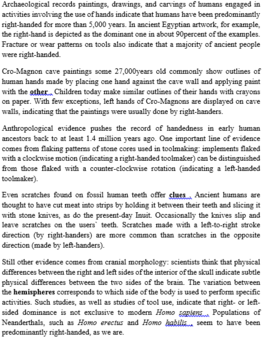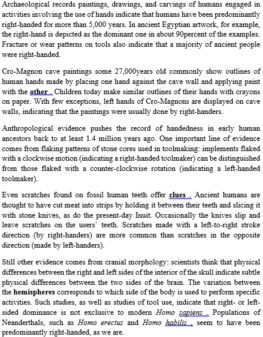Read the following passage and mark the letter A, B, C, or D on your answer sheet to indicate the correct answer to each of the questions from 36 to 42.
It is estimated that by 2050 more than two-thirds of the world's population will live in cities, up from about 54 percent today. While the many benefits of organized and efficient cities are well understood, we need to recognize that this rapid, often unplanned urbanization brings risks of profound social instability, risks to critical infrastructure, potential water crises and the potential for devastating spread of disease. These risks can only be further exacerbated as this unprecedented transition from rural to urban areas continues.
How effectively these risks can be addressed will increasingly be determined by how well cities are governed. The increased concentration of people, physical assets, infrastructure and economic activities mean that the risks materializing at the city level will have far greater potential to disrupt society than ever before.
Urbanization is by no means bad by itself. It brings important benefits for economic, cultural and societal development. Well managed cities are both efficient and effective, enabling economies of scale and network effects while reducing the impact on the climate of transportation. As such, an urban model can make economic activity more environmentally-friendly. Further, the proximity and diversity of people can spark innovation and create employment as exchanging ideas breeds new ideas.
But these utopian concepts are threatened by some of the factors driving rapid urbanization. For example, one of the main factors is rural-urban migration, driven by the prospect of greater employment opportunities and the hope of a better life in cities. But rapidly increasing population density can create severe problems, especially if planning efforts are not sufficient to cope with the influx of new inhabitants. The result may, in extreme cases, be widespread poverty. Estimates suggest that 40% of the world's urban expansion is taking place in slums, exacerbating socio-economic disparities and creating unsanitary conditions that facilitate the spread of disease.
The Global Risks 2015 Report looks at four areas that face particularly daunting challenges in the face of rapid and unplanned urbanization: infrastructure, health, climate change, and social instability. In each of these areas we find new risks that can best be managed or, in some cases, transferred through the mechanism of insurance.
Question 36: The word “that" in paragraph 4 refers to __________.
A. urban expansion B. socio-economic disparities
C. disease D. unsanitary conditions
Question 37:According to paragraph 3, what is one of the advantages of urbanization?
A. It minimizes risks for economic, cultural and societal development.
B. It makes water supply system both efficient and effective.
C. Weather and climate in the city will be much improved.
D. People may come up with new ideas for innovation.
Question 38:Which statement is TRUE, according to the passage?
A. Urbanization brings important benefits for development as well.
B. 54% of the world's population will live in cities by 2050.
C. Risks cannot be addressed effectively no matter how well cities are governed.
D. Rapidly increasing population density can help solve poverty.
Question 39: The word "addressed" in paragraph 2 is closest in meaning to _________.
A. aimed at B. dealt with C. added to D. agreed on
Question 40: What can be inferred from the passage?
A. Poverty may be a foregone conclusion of unplanned urbanization.
B. Diseases are caused by people migrating to cities.
C. Urbanization can solve the problem of environmental pollution in cities.
D. The increasing number of people in cities can create more employment.
Question 41: Which is the most suitable title for the passage?
A. The Risks of Rapid Urbanization in Developing Countries
B. Infrastructure and Economic Activities in Cities
C. The Global Risks 2015 Report on Developing Urban Areas
D. Rapid Urbanization Put Cities in Jeopardy
Question 42: The word “spark” in paragraph 3 is closest in meaning to ___________.
A. need B. start C. encourage D. design
Hãy nhập câu hỏi của bạn vào đây, nếu là tài khoản VIP, bạn sẽ được ưu tiên trả lời.

29. According to the passage, what does television bring us? A. noise from around the worldB. man’s most important means of talking C. events and sounds from around the worldD. president making a speech
30. According to the passage, what don’t entertainment programs include? A. dramasB. newsC. motion picturesD. comedies
31. According to the passage, which of the following is NOT true? A. Television can bring us entertainment.B. Television can take us out of this world. C. Television can help us widen our knowledge. D. Television can help us make money.
32. The word “provides” in the second paragraph is best replaced by ________. A. suppliesB. dividesC. admiresD. separates

Đáp án: D
Giải thích: Ở câu "Slang, however, refers to words and expressions understood by a large number of speakers but not accepted as appropriate formal usage by the majority.", tác giả có nhắc đến “Tiếng lóng chỉ từ ngữ và cách diễn đạt nhiều người hiểu nhưng không được phần đông chấp nhận là ngôn ngữ trang trọng.”

Đáp án D
Giải thích: the number of + Động từ số ít => has
Dịch nghĩa: Thế giới đang trở nên công nghiệp hóa và số lượng giống loài động vật những con mà dần trở nên tuyệt chủng đang tăng






Question 36: The word “that" in paragraph 4 refers to __________.
A. urban expansion B. socio-economic disparities
C. disease D. unsanitary conditions
Question 37:According to paragraph 3, what is one of the advantages of urbanization?
A. It minimizes risks for economic, cultural and societal development.
B. It makes water supply system both efficient and effective.
C. Weather and climate in the city will be much improved.
D. People may come up with new ideas for innovation.
Question 38:Which statement is TRUE, according to the passage?
A. Urbanization brings important benefits for development as well.
B. 54% of the world's population will live in cities by 2050.
C. Risks cannot be addressed effectively no matter how well cities are governed.
D. Rapidly increasing population density can help solve poverty.
Question 39: The word "addressed" in paragraph 2 is closest in meaning to _________.
A. aimed at B. dealt with C. added to D. agreed on
Question 40: What can be inferred from the passage?
A. Poverty may be a foregone conclusion of unplanned urbanization.
B. Diseases are caused by people migrating to cities.
C. Urbanization can solve the problem of environmental pollution in cities.
D. The increasing number of people in cities can create more employment.
Question 41: Which is the most suitable title for the passage?
A. The Risks of Rapid Urbanization in Developing Countries
B. Infrastructure and Economic Activities in Cities
C. The Global Risks 2015 Report on Developing Urban Areas
D. Rapid Urbanization Put Cities in Jeopardy
Question 42: The word “spark” in paragraph 3 is closest in meaning to ___________.
A. need B. start C. encourage D. design